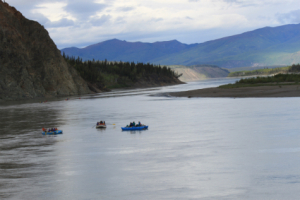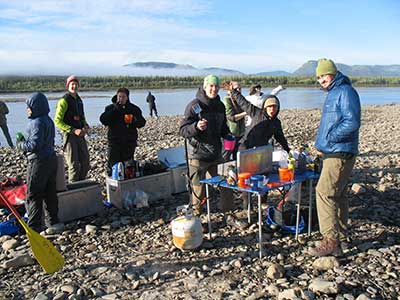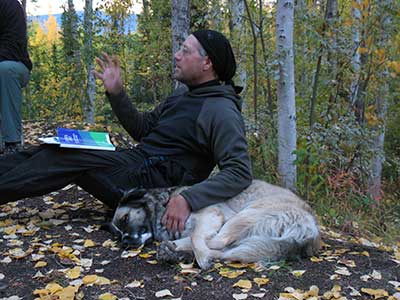
“This is a dramatic way to learn personal responsibility,” said Simon Frez-Albrecht, an Outdoor Studies major and among Expedition teaching assistants.
For some students, the 10-day, 158-mile journey along the historic Yukon River was the first tent camping they’d done. For others, like 26-year-old sustainability studies major Yarden Shalit, the float trip was a first chance to see the Interior after having worked in oil spill response along Alaska’s coast.
Departing in three groups from Eagle on Sept. 4 and traveling in rafts and canoes, the inaugural launch of Expedition Alaska went as planned, said Timothy Rawson, associate professor of history.
Rawson and Outdoor Studies Associate Professor David McGivern designed the first-year course and traveled the Yukon. Joining them on the river were Affiliate Faculty Betsy Young and APU President Don Bantz. Amanda Booth, geology assistant professor, is on-campus Expedition faculty.
The trip ended at Circle and returned to campus by University vans on Sept.14. Gear was hauled to the river and back in a semi operated by Carlile Transportation. The fall block course ends Friday.

“It was a great trip!” van der Most said Monday.
Traveling the whole way as mascot was Hector, Rawson’s mixed-breed dog.
Of 33 students who began the expedition, one returned early to campus because of nausea.
Rawson, who’s teaching the sustainability studies section of Expedition Alaska, said overcast weather turned stormy as the group was en route to Slaven’s Roadhouse. West winds made for some of the roughest waters that locals had seen, Rawson said. All arrived safely and gathered inside for food, warmth and camaraderie.
“The students were plucky,” he said. “We’re already planning an end-of-year adventure.”
Among highlights were classes held outdoors along the river or in the evenings under the shelter of lightweight, packable tipis.
“They gave everyone a chance to get together inside around a wood stove,” Rawson said. “They were ideal for teaching.”

